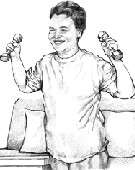Muscle-building teens may go to extremes, study finds

(HealthDay)—Many teenagers want a toned physique, and some use unhealthy tactics to get one, new research finds.
A survey of about 2,800 Minnesota teens found that nearly all boys were doing something to boost their muscle mass. Most often, that meant exercise. But 6 percent said they'd used steroids in the past year, while almost 11 percent used some other muscle-enhancing substance, such as creatine or DHEA.
Girls were also keen on getting toned, researchers report in the December issue of Pediatrics, published online Nov. 19.
Almost two-thirds said they exercised specifically to gain muscle, at least "sometimes." Nearly 5 percent reported using steroids, while a similar number said they took other muscle enhancers.
The findings are concerning, said lead researcher Marla Eisenberg, an associate professor at the University of Minnesota, in Minneapolis.
Steroid use is obviously risky; side effects range from acne and unwanted body hair to heart attacks and liver disease.
But Eisenberg said even exercise or diet changes can be negative, if kids do it just to adhere to a certain body ideal.
"We specifically asked whether they were doing those things to increase muscle mass or tone," Eisenberg said. "If a kid is often exercising for that reason, it might point to body-image concerns."
A researcher not involved in the study agreed.
"It's important to remember that the kids in this study are not saying they exercise for fun or to be healthy," said Linda Smolak, a professor emerita of psychology at Kenyon College in Gambier, Ohio, who focuses on child development and eating disorders.
Some teens may want to build muscle to get a certain "look." Others may do it for a sport, Smolak pointed out. In this study, students playing team sports were more likely to be trying to add muscle; boys on sports teams, for example, were twice as likely as other boys to use protein shakes or powders.
And what's wrong with protein shakes? Not necessarily anything, study author Eisenberg said.
"But it could be an unhealthy behavior if they're using protein shakes to replace real food," Eisenberg said. Kids who down protein supplements may be overly focused on gaining a certain body type.
The findings are based on surveys of 2,793 middle- and high-school students in the Minneapolis area. They were a diverse group: 29 percent were black, 20 percent Asian and 17 percent Hispanic.
Among boys, more than 90 percent said they exercised specifically to boost muscle mass, including 41 percent who said they'd "often" done so in the past year. Forty-five percent said they'd altered their diets with the goal of bulking up at least "sometimes," while 19 percent used protein supplements sometimes or often.
Of the girls, about 43 percent had changed their diets, and 64 percent had worked out to boost muscle, sometimes or often, in the past year. About 8 percent had used protein supplements sometimes or often.
Those figures are slightly higher than some other recent studies have found, the researchers say. And since the students came from one urban area, it's not clear whether the numbers would reflect all U.S. kids. Nor is it known why so many kids want more muscle. The researchers did not ask about that, Eisenberg said.
But in general, she noted, it's hard not to notice that sports figures and celebrities are "bigger" or more toned than they used to be—and that we are surrounded by images of them.
What's not clear is whether today's kids are any more muscle conscious than past generations were. Studies have only looked at that question in the past decade or so.
Similarly, it's only in recent years that studies have looked at boys' body-image issues at all, Smolak at Kenyon College pointed out. But, she said, some studies have suggested that when you look at all forms of body-image worries—not just the quest for thinness, but for a toned, athletic form, too—boys are just as affected as girls.
Parents should be concerned, Eisenberg said, if they see signs that their child is overly interested in physique. Those signs include constantly checking the mirror, suddenly shifting to a high-protein diet or excessively working out.
Smolak also warned against placing too much importance on your kids' sports achievement, since they may think they need a certain body type to excel. "We all have different bodies," she said. "It is not a great idea to try to fit into a stereotype or a socially prescribed ideal, even for a sport."
More information: Learn about developing positive body image from the Academy of Nutrition and Dietetics.
Abstract
Full Text (subscription or payment may be required)
Copyright © 2012 HealthDay. All rights reserved.













